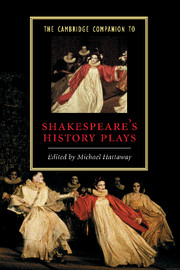4 - Elizabethan historiography and Shakespeare's sources
from PART 1 - CONTEXTS
Published online by Cambridge University Press: 28 May 2006
Summary
'Enter Time, holding an hour-glass', to usher in a new generation. Like most of his contemporaries, Shakespeare was aware of time's destructive powers. Unlike most of them, he was also sensitive to its healing qualities. Before his own farewell to the stage, he gave a speaking part to this major actor of the human drama. Richard II played with time, and discovered too late that a king can shorten lives but not add one minute to his own, nor call back yesterday to correct fatal errors. At the end of the Plantagenet sequence Henry V, who has learnt from his predecessors' mistakes, 'weighs time to the utmost grain'.
Time as a devourer had become an obsessive theme for Renaissance authors. A desperate fight against oblivion inspired the writing strategies of the poets and dramatists, who turned to historians for materials to feed their anxieties. Their forebears, like all humble Christians, had little time for this earthly life and no great doubt of their ultimate salvation. For a majority of them, life was indeed an ordeal, a passage through a vale of tears, mercifully ended by death and the reward of eternal bliss. Their main fear was of the Devil, whose traps could lure the weak flesh to damnation. If man would but see reason, Hell was too heavy a price for any pleasures the earth could afford.
- Type
- Chapter
- Information
- The Cambridge Companion to Shakespeare's History Plays , pp. 57 - 70Publisher: Cambridge University PressPrint publication year: 2002
- 3
- Cited by



